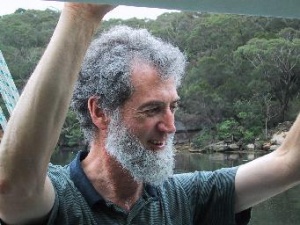Difference between revisions of "Ross Quinlan"
GerdIsenberg (talk | contribs) (Created page with "'''Home * People * Ross Quinlan''' FILE:quinlan-small.jpg|border|right|thumb|link=https://www.rulequest.com/Personal/| Ross Quinlan <ref>[https://www.rul...") |
GerdIsenberg (talk | contribs) |
||
| Line 11: | Line 11: | ||
as used in [https://en.wikipedia.org/wiki/Decision_tree_learning decision tree learning], Ross Quinlan invented the tree induction algorithms [https://en.wikipedia.org/wiki/ID3_algorithm Iterative Dichotomiser 3] (ID3) | as used in [https://en.wikipedia.org/wiki/Decision_tree_learning decision tree learning], Ross Quinlan invented the tree induction algorithms [https://en.wikipedia.org/wiki/ID3_algorithm Iterative Dichotomiser 3] (ID3) | ||
<ref>[https://www.cise.ufl.edu/~ddd/cap6635/Fall-97/Short-papers/2.htm The ID3 Algorithm]</ref> | <ref>[https://www.cise.ufl.edu/~ddd/cap6635/Fall-97/Short-papers/2.htm The ID3 Algorithm]</ref> | ||
| − | and their successors [https://en.wikipedia.org/wiki/C4.5_algorithm C4.5], and [https://en.wikipedia.org/wiki/C4.5_algorithm#Improvements_in_C5.0/See5_algorithm C5.0] <ref>[https://www.rulequest.com/see5-info.html Information on See5/C5.0]</ref> <ref>[https://www.rulequest.com/see5-comparison.html Is C5.0 Better Than C4.5?]</ref>. | + | and their successors [https://en.wikipedia.org/wiki/C4.5_algorithm C4.5] <ref>[[Mathematician#CDrummond|Chris Drummond]], [[Robert Holte]] ('''2003'''). ''C4.5, Class Imbalance, and Cost Sensitivity: Why Under-Sampling beats Over-Sampling''. [https://www.site.uottawa.ca/~nat/Workshop2003/workshop2003.html ICML 2003 Workshop on Learning from Imbalanced Data Sets (II)], [https://www.site.uottawa.ca/~nat/Workshop2003/drummondc.pdf pdf]</ref>, and [https://en.wikipedia.org/wiki/C4.5_algorithm#Improvements_in_C5.0/See5_algorithm C5.0] <ref>[https://www.rulequest.com/see5-info.html Information on See5/C5.0]</ref> <ref>[https://www.rulequest.com/see5-comparison.html Is C5.0 Better Than C4.5?]</ref>. |
and further introduced the [https://en.wikipedia.org/wiki/First-order_inductive_learner first-order inductive learner] (FOIL). One application of these algorithms is to discover classifications rules for [[Endgame|chess endgames]], as shown with KRKN and ID3 in ''Learning Efficient Classification Procedures and Their Application to Chess End Games'' <ref>[[Ross Quinlan]] ('''1983'''). ''[https://link.springer.com/chapter/10.1007/978-3-662-12405-5_15 Learning Efficient Classification Procedures and Their Application to Chess End Games]''. in [https://link.springer.com/book/10.1007%2F978-3-662-12405-5 Machine Learning: An Artificial Intelligence Approach]</ref> . | and further introduced the [https://en.wikipedia.org/wiki/First-order_inductive_learner first-order inductive learner] (FOIL). One application of these algorithms is to discover classifications rules for [[Endgame|chess endgames]], as shown with KRKN and ID3 in ''Learning Efficient Classification Procedures and Their Application to Chess End Games'' <ref>[[Ross Quinlan]] ('''1983'''). ''[https://link.springer.com/chapter/10.1007/978-3-662-12405-5_15 Learning Efficient Classification Procedures and Their Application to Chess End Games]''. in [https://link.springer.com/book/10.1007%2F978-3-662-12405-5 Machine Learning: An Artificial Intelligence Approach]</ref> . | ||
Revision as of 11:51, 1 May 2020

John Ross Quinlan,
an Australian computer scientist and researcher in machine learning, data mining, and decision theory along with first-order logic and inductive logic programming.
He runs his company RuleQuest Research [2], and was affiliated with the University of Sydney, the University of Technology Sydney, the University Of New South Wales and the RAND Corporation.
Based on the concept learning [3] by Earl B. Hunt [4] as used in decision tree learning, Ross Quinlan invented the tree induction algorithms Iterative Dichotomiser 3 (ID3) [5] and their successors C4.5 [6], and C5.0 [7] [8]. and further introduced the first-order inductive learner (FOIL). One application of these algorithms is to discover classifications rules for chess endgames, as shown with KRKN and ID3 in Learning Efficient Classification Procedures and Their Application to Chess End Games [9] .
Contents
Selected Publications
1968 ...
- Ross Quinlan, Earl B. Hunt (1968). A Formal Deductive Problem-Solving System. Journal of the ACM, Vol. 15, No. 4
- Ross Quinlan (1969). A Task-Independent Experience-Gathering Scheme for a Problem Solver. IJCAI 1969
1970 ...
- Ross Quinlan (1975). Predicting The Length Of Solutions To Problems. IJCAI 1975, pdf
- Ross Quinlan (1979). Discovering Rules by Induction from Large Collections of Examples. Expert Systems in the Micro-electronic Age (Introducing ID3)
1980 ...
- Ross Quinlan (1980). An Introduction to Knowledge-Based Expert Systems. Australian Computer Journal, Vol. 12, No. 2, pdf
- Ross Quinlan (1982). Semi-Autonomous Acquisition of Pattern-Based Knowledge. Introductory Readings in Expert Systems
- Ross Quinlan (1983). Learning Efficient Classification Procedures and Their Application to Chess End Games. in Machine Learning: An Artificial Intelligence Approach
- Ross Quinlan (1986). Induction of Decision Trees. Machine Learning, Vol. 1, No. 1
- Ross Quinlan (1986). The Effect of Noise on Concept Learning. Machine Learning: An Artificial Intelligence Approach, Vol. 2
1990 ...
- Ross Quinlan (1990). Learning Logical Definitions from Relations. Machine Learning, Vol. 5, No. 3
- Ross Quinlan (1993). C4.5: Programs for Machine Learning. Morgan Kaufmann
- Ross Quinlan (1996). Improved Use of Continuous Attributes in C4.5. Journal of Artificial Intelligence Research, Vol. 4, arXiv:cs/9603103
- Ross Quinlan (1996). Learning First-Order Definitions of Functions. Journal of Artificial Intelligence Research, Vol. 5, arXiv:cs/9610102
- Ron Kohavi, Ross Quinlan (1999). Decision Tree Discovery. pdf
External Links
- Ross Quinlan's personal homepage
- Ross Quinlan from Wikipedia
- J. Ross Quinlan from Gabor Melli's Research Knowledge Base
References
- ↑ Ross Quinlan's personal homepage
- ↑ RuleQuest Research - Data Mining Tools
- ↑ The Machine Learning Dictionary - CLS
- ↑ Earl B. Hunt (1962). Concept Learning: An Information Processing Problem. Wiley
- ↑ The ID3 Algorithm
- ↑ Chris Drummond, Robert Holte (2003). C4.5, Class Imbalance, and Cost Sensitivity: Why Under-Sampling beats Over-Sampling. ICML 2003 Workshop on Learning from Imbalanced Data Sets (II), pdf
- ↑ Information on See5/C5.0
- ↑ Is C5.0 Better Than C4.5?
- ↑ Ross Quinlan (1983). Learning Efficient Classification Procedures and Their Application to Chess End Games. in Machine Learning: An Artificial Intelligence Approach
- ↑ DBLP: J. Ross Quinlan
- ↑ ICGA Reference Database (pdf)